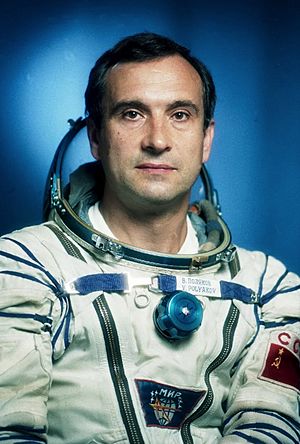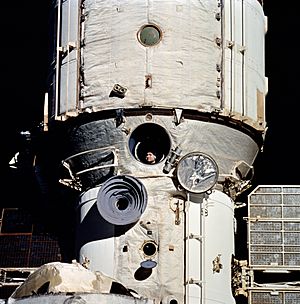Valeri Polyakov facts for kids
Quick facts for kids
Valeri Polyakov
|
|
|---|---|
 |
|
| Born |
Valeri Vladimirovich Polyakov
27 April 1942 Tula, Russian SFSR, Soviet Union
|
| Died | 19 September 2022 (aged 80) Moscow, Russia
|
| Nationality | Russian |
| Occupation | Medical doctor |
| Awards | See below |
| Space career | |
| Roscosmos cosmonaut | |
|
Time in space
|
678d 16h 32m |
| Selection | Medical Group 3 |
| Missions | Mir EO-3 / Mir EO-4 (Soyuz TM-6 / Soyuz TM-7), Mir EO-15 / Mir EO-16 / Mir EO-17 (Soyuz TM-18 / Soyuz TM-20) |
|
Mission insignia
|
|
Valeri Vladimirovich Polyakov (Russian: Валерий Владимирович Поляков, born Valeri Ivanovich Korshunov; 27 April 1942 – 19 September 2022) was a Russian cosmonaut. He holds the record for the longest single trip in space. He stayed on the Mir space station for over 14 months (437 days and 18 hours) during one mission. If you add up all his time in space, it was more than 22 months!
Valeri Polyakov was chosen to be a cosmonaut in 1972. His first space trip was in 1988 aboard Soyuz TM-6. He came back to Earth 240 days later on Soyuz TM-7. His second trip was from 1994 to 1995. He spent 437 days in space, launching on Soyuz TM-18 and landing on Soyuz TM-20. This set the world record for the longest time anyone has ever spent continuously in space.
Contents
Early Life and Education
Valeri Polyakov was born in Tula, in the Soviet Union, on April 27, 1942. His birth name was Valeri Ivanovich Korshunov. He changed his name in 1957 after his stepfather adopted him. He went to Tula Secondary School No. 4 and finished in 1959.
He then studied at the I. M. Sechenov 1st Moscow Medical Institute. He earned a medical degree there. After that, he joined the Institute of Medical and Biological Problems in Moscow. He became a specialist in space medicine. Polyakov decided to work in space medicine in 1964. This was after the first doctor in space, Boris Yegorov, flew on Voskhod 1.
Cosmonaut Career

Valeri Polyakov was chosen as a cosmonaut on March 22, 1972. His first flight into space was on Soyuz TM-6 in 1988. He stayed on the Mir space station for 240 days. During this time, he did many experiments. He returned to Earth on Soyuz TM-7.
Polyakov's second spaceflight was the longest human spaceflight ever. It started on January 8, 1994, with the launch of the Soyuz TM-18 mission. He spent about 437 days on Mir. He conducted many experiments and scientific studies. During this flight, he orbited the Earth over 7,000 times. On January 9, 1995, after 366 days in space, Polyakov officially broke the previous spaceflight record. This record was set by Vladimir Titov and Musa Manarov six years earlier. He came back to Earth on Soyuz TM-20 on March 22, 1995.
When he landed, Polyakov chose to walk a short distance instead of being carried. He wanted to show that humans could still be strong enough to walk on Mars after a very long trip in space.
Polyakov volunteered for his 437-day flight to learn how the human body reacts to micro-gravity. This information is important for long missions to Mars. After his second spaceflight, Polyakov held the record for the most total time spent in space. This record was later broken by Sergei Avdeyev. The current record holder is Gennady Padalka.
Scientists used information from Polyakov's flight. They found that people can stay mentally healthy during long spaceflights, just like on Earth.
Health Studies in Space
Polyakov had medical checks before, during, and after his flight. He also had two more checks six months after returning to Earth. When doctors compared the results, they found something interesting. His thinking skills were fine. However, his mood got a bit worse during the first few weeks in space and after returning to Earth. His mood became normal again between the second and fourteenth month of his mission.
The studies also showed that Polyakov did not have any long-lasting problems with his performance after coming back to Earth. Because of these findings, researchers believe that people can stay in a good mood and function well during very long spaceflights. This is good news for future missions to Mars.
Spaceflights
- Soyuz TM-6 / Soyuz TM-7 – August 28, 1988, to April 27, 1989 – 240 days, 22 hours, 34 minutes
- Soyuz TM-18 / Soyuz TM-20 – January 8, 1994, to March 22, 1995 – 437 days, 17 hours, 58 minutes
Later Life
Valeri Polyakov stopped being a cosmonaut in June 1995. He had spent a total of over 678 days in space. In 1999, he took part in an experiment called SFINCSS-99. This experiment simulated a flight of an international crew on a space station.
Polyakov was the Deputy Director of the Ministry of Public Health in Moscow. He was in charge of the medical parts of long space missions. He was also a member of the Russian Chief Medical Commission. This group helps choose and qualify cosmonauts. He was also a member of the International Space Researchers' Association and the International Academy of Astronautics. Polyakov was married and had one child.
After returning from space, Polyakov continued to be active in international spaceflight. He became a "cosmonaut-investigator" for the United States, Austria, Germany, and France. He helped with their space science missions to the Mir space station. Valeri Polyakov passed away on September 19, 2022, at the age of 80.
Legacy and Awards
Polyakov received many awards for his spaceflights and academic achievements. These include the Hero of the Soviet Union, Hero of the Russian Federation, Order of Lenin, Order of the Legion of Honour, and the Order of Parasat. He was a member of groups related to astronautics. This included the Russian Chief Medical Commission for cosmonaut certification.
Polyakov held the title of "Pilot-Cosmonaut of the USSR." He also wrote several books and papers. These works were about life sciences, medical parts of space missions, and the results of his research on long spaceflights.
Polyakov's record for the longest total time in space was 678 days over two missions. This record stood until 1999. Cosmonaut Sergei Avdeyev then broke it with a total of 747 days in space during three different missions.
Honours and Awards
- Hero of the Russian Federation
- Hero of the Soviet Union
- Officer of the Legion of Honour (France)
- Order of Lenin
- Pilot-Cosmonaut of the USSR
- Prince of Asturias Award (now Princess of Asturias Awards, Spain)
- Order of Parasat (Kazakhstan)
See also
 In Spanish: Valeri Poliakov para niños
In Spanish: Valeri Poliakov para niños
 | Delilah Pierce |
 | Gordon Parks |
 | Augusta Savage |
 | Charles Ethan Porter |

